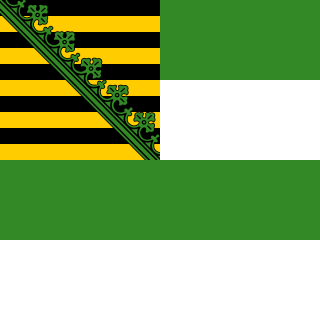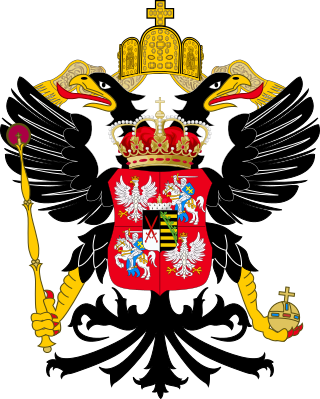
Bavaria, officially the Free State of Bavaria, is a state in the southeast of Germany. With an area of 70,550.19 km2 (27,239.58 sq mi), it is the largest German state by land area, comprising roughly a fifth of the total land area of Germany. With over 13 million inhabitants, it is the second most populous German state behind North Rhine-Westphalia, but due to its large physical size its population density is below the German average. Major cities include Munich, Nuremberg, and Augsburg.

Saxony, officially the Free State of Saxony, is a landlocked state of Germany, bordering the states of Brandenburg, Saxony-Anhalt, Thuringia, Bavaria, as well as the countries of Poland and the Czech Republic. Its capital is Dresden, and its largest city is Leipzig. Saxony is the tenth largest of Germany's sixteen states, with an area of 18,413 square kilometres (7,109 sq mi), and the sixth most populous, with more than 4 million inhabitants.

Maximilian, Margrave of Baden, also known as Max von Baden, was a German prince, general, and politician. He was heir presumptive to the throne of the Grand Duchy of Baden, and in October and November 1918 briefly served as the last chancellor of the German Empire and minister-president of Prussia. He sued for peace on Germany's behalf at the end of World War I based on U.S. President Woodrow Wilson's Fourteen Points and took steps towards transforming the government into a parliamentary system. As the German Revolution of 1918–1919 spread, he handed over the office of chancellor to SPD Chairman Friedrich Ebert and unilaterally proclaimed the abdication of Emperor Wilhelm II. Both events took place on 9 November 1918, marking the beginning of the Weimar Republic.

Ludwig III was the last King of Bavaria, reigning from 1913 to 1918. Initially, he served in the Bavarian military as a lieutenant and went on to hold the rank of Oberleutnant during the Austro-Prussian War. He entered politics at the age of 18 becoming a member of the Bavarian parliament and was a keen participant in politics, supporting electoral reforms. Later in life, he served as regent and de facto head of state from 1912 to 1913, ruling for his cousin, Otto. After the Bavarian parliament passed a law allowing him to do so, Ludwig deposed Otto and assumed the throne for himself. He led Bavaria during World War I. His short reign was seen as championing conservative causes and he was influenced by the Catholic encyclical Rerum novarum.

Georg Friedrich Karl Freiherr von Hertling, from 1914 Count von Hertling, was a German politician of the Catholic Centre Party. He was foreign minister and minister president of Bavaria, then chancellor of the German Reich and minister president of Prussia from 1 November 1917 to 30 September 1918. He was the first party politician to hold the two offices; all the others were non-partisan.
Free state is a term occasionally used in the official titles of some states throughout the world with varying meanings depending on the context. In principle, the title asserts and emphasises a particular freedom of the state in question, but this is not always reflected in practice. Some states use the title to assert sovereignty or independence from foreign domination, while others have used it to assert autonomy within a larger nation-state. Sometimes "free state" is used as a synonym for "republic".

Saxe-Meiningen was one of the Saxon duchies held by the Ernestine line of the House of Wettin, located in the southwest of the present-day German state of Thuringia.

The German Emperor was the official title of the head of state and hereditary ruler of the German Empire. A specifically chosen term, it was introduced with the 1 January 1871 constitution and lasted until the official abdication of Wilhelm II on 9 November 1918. The Holy Roman Emperor is sometimes also called "German Emperor" when the historical context is clear, as derived from the Holy Roman Empire's official name of "Holy Roman Empire of the German Nation" from 1512.

The Kingdom of Bavaria was a German state that succeeded the former Electorate of Bavaria in 1806 and continued to exist until 1918. With the unification of Germany into the German Empire in 1871, the kingdom became a federated state of the new empire and was second in size, power, and wealth only to the leading state, the Kingdom of Prussia.

The Roter Frontkämpferbund, usually called the Rotfrontkämpferbund (RFB), was a far-left paramilitary organization affiliated with the Communist Party of Germany (KPD) during the Weimar Republic. A legally registered association, the RFB was banned in 1929 but continued its work illegally.
Conservatism in Germany has encompassed a wide range of theories and ideologies in the last three hundred years, but most historical conservative theories supported the monarchical/hierarchical political structure.

An imperial vicar was a prince charged with administering all or part of the Holy Roman Empire on behalf of the emperor. Later, an imperial vicar was invariably one of two princes charged by the Golden Bull with administering the Holy Roman Empire during an interregnum.
The Anif declaration was issued by Ludwig III, King of Bavaria, on 12 November 1918 at Anif Palace, Austria.

Georg, Crown Prince of Saxony or George the last Crown Prince of Saxony, was the heir to the King of Saxony, Frederick Augustus III, at the time of the monarchy's abolition on 13 November 1918. He later became a Roman Catholic priest and a Jesuit.
Buß- und Bettag was a public holiday in Germany, and is still a public holiday in Saxony. In Germany, Protestant church bodies of Lutheran, Reformed (Calvinist) and United denominations celebrate a day of repentance and prayer. It is now celebrated on the penultimate Wednesday before the beginning of the Protestant liturgical year on the first Sunday of Advent; in other words, it is the Wednesday that falls between 16 and 22 November. However, it is not a statutory non-working holiday any more, except in the Free State of Saxony. In the Free State of Bavaria, it is a school holiday only.
The Bavarian monarchy ended with the declaration of a republic after the Anif declaration by King Ludwig III on 12 November 1918 as a consequence of Germany's defeat in the First World War. Monarchism was thereafter particularly strong between 1918 and 1933, when an attempt was made to either make Crown Prince Rupprecht king or general state commissioner in an attempt to forestall the rise of the Nazis to power in the state.

The Monarchy of Germany was the system of government in which a hereditary monarch was the sovereign of the German Empire from 1871 to 1918.

The Free State of Coburg emerged from the Duchy of Saxe-Coburg and Gotha at the end of the First World War. It existed from November 1918 until its union with the Free State of Bavaria on 1 July 1920.

Beginning in 1925, some members of higher levels of the German nobility joined the Nazi Party, registered by their title, date of birth, NSDAP Party registration number, and date of joining the Nazi Party, from the registration of their first prince (Ernst) into NSDAP in 1928, until the end of World War II in 1945.

The German constitutional reforms of October 1918 consisted of several constitutional and legislative changes that transformed the German Empire into a parliamentary monarchy for a brief period at the end of the First World War. The reforms, which took effect on 28 October 1918, made the office of Reich chancellor dependent on the confidence of the Reichstag rather than that of the German emperor and required the consent of both the Reichstag and the Bundesrat for declarations of war and for peace agreements.













